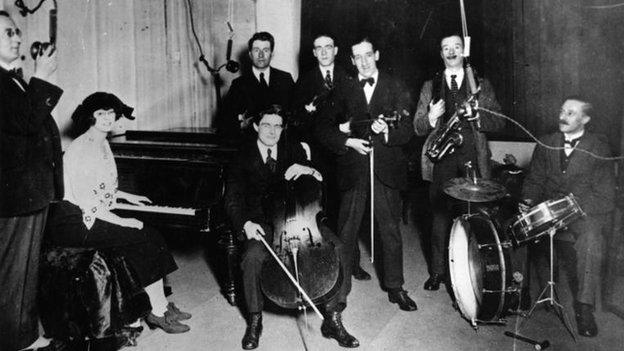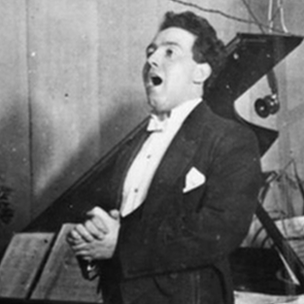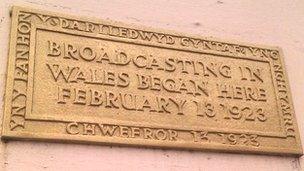Broadcasting in Wales: 90 years since BBC went on air
- Published

Musicians on the first day in the studio in Castle Street, Cardiff, on 13 February, 1923
Until 13 February 1923, if you had turned on a radio in Wales, all you would have heard would have been static fuzz, and maybe some Morse code if you were lucky.
But 90 years ago all that changed when 5WA - an indirect ancestor of BBC Radio Wales - took to the air.
It broadcast from a tiny studio above a music shop at 19 Castle Street in Cardiff city centre, starting at 5pm.
And at 9.30 that evening Blaina-born baritone Mostyn Thomas, sang Dafydd y Garreg Wen, the first Welsh language song on air.
The building is still there today, housing a supermarket, and carries a small reminder of its place in history in the form of a commemorative wall plaque.
Speaking to BBC Wales on the 50th anniversary in 1973, Mostyn Thomas recalled what a momentous yet rudimentary occasion that first broadcast was.
"It was touch and go whether we were going to be ready in time," he said.
"Engineers were stringing up microphones from the ceiling and testing equipment with seconds to go."

Mostyn Thomas recalled later how the debut broadcast only just made it to air
"I hardly had any time to practice, which made me extremely nervous, as in those days microphones weren't simple things to use.
"You had to stand close for deep and quiet notes, and move away for louder higher notes, and getting the right balance was more of an art than a science."
"But we simply had to be ready - the start time had been advertised in all the newspapers - so we were, by the skin of our teeth."
In 1923 a valve radio set cost about £7, more than £300 in today's prices.
So little wonder that at the time of the broadcast only about 200 receiving licences had been sold, although it is possible that many more tuned in on homemade crystal "cat's whisker" sets.
Kevin Williams, professor of media and communication studies at Swansea University, explained how those early BBC-affiliated stations differed greatly from the corporation as we know it today.
"You have to remember that until 1927 the BBC was the British Broadcasting Company, a commercial operation set up by Marconi, General Electric, The Radio Communications Co, Metropolitan Vickers, Western Electric and The British Thompson-Houston Company."
Broadcaster Vincent Kane and media professor Tom O'Malley look back on 90 years of broadcasting
"They'd developed the technology for people to receive radio signals at home, but couldn't sell them in profitable enough quantities until there were broadcasts to which customers could listen. In that sense you could liken the early BBC to a subsidised app store driving sales of smartphones."
As a commercial enterprise the BBC worried some, most notably the government, who feared the potential of mass communication, and the papers who sought to protect their monopoly over news.
As a consequence news bulletins were permitted only from 7pm, after the daily newspapers had been sold, and editors were quick to publicise any controversy surrounding the radio "upstarts".
A prime example was the column inches given to complaints about Welsh content from listeners in Bristol, as 5WA initially had to serve audiences in Wales and the west of England.

A plaque on the Cardiff building where broadcasting began in 1923
One editorial berated the "unintelligible gabbling," and "dreary hymn singing" on the station, leading to a split in Welsh and west of England services, which historian Dr John Davies believes was highly significant.
"Until 5WA, and its successors in Wales, there was no notion of a Welsh media as such," said Dr Davies.
"Cardiff had its news, and Wrexham theirs, but the idea of Wales as a single socio-political entity was purely an invention of the early BBC."
"Everyone accepted that on the one hand there was Scotland, and on the other there was 'England and Wales'. But 5WA set the precedent which would lead to the establishment of BBC Wales, and ultimately S4C."
From those 200 pioneering listeners to the first broadcast, it took until 1936 for Wales to reach 300,000 radio licences, a figure at which it was estimated that everyone in Wales had direct or indirect access to a wireless set.
While many have forecast that radio has had its day, the latest data from Rajar, which collects listening figures, shows that 90% of those in Wales still listen at least once a week.
- Published16 July 2012
- Published12 July 2011